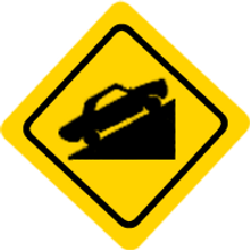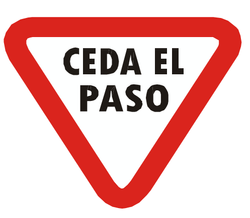
JOANNA TENORIO
 senal-de-transito |  resbaloso |
|---|---|
 srxj |  1464883617 |
 imagesjbh |  kods3 |
 Imagen extintor |  tumblr_ndzntvitdT1u1emcso2_1280 |
 MecanicLogo |  9646464-Yellow-sign-with-a-kangaroo-Stock-Vector-australia |
 1464883617 |  danger |
 1464883616 |  th |
 4312721 |  images |
Actividad 13
UNIT III. MY WAY OF PROCEDURE
ACTIVITY 13. RESPECTING STANDARDS
DATE OF COMPLETION: FROM MAY 16TH TO MAY 20TH 2016
¿Cuales son las funciones de los modales should, must, have to?
Should
It is used to give advice. It indicates that something is good and therefore should be done. It is a recommendation, not an obligation. Has less tax force "must" and "have to".
If you feel bad You should go to the Doctor
It is also used to give an order but in a very polite way.
Anyone Who wants to enter the conference Should show His credentials
(It is really a mandatory obligation-that show the credentials to enter the conference-, but is expressed in some coercive)
Must / Have to
Express an obligation, something needs to be done.
Immediately You must come here (it's an order)
If you want to make a career in a company You have to speak Inglés (No alternative: either speak English or no career possible)
See the difference with the following sentence:
Nowdays it is very Important to speak Inglés. You should do it.
Here is a tip, while the former was an obligation.
On the other hand, when "must" / "have to" issuer conviction that the obligation will be fulfilled, whereas when "should" is used is not known whether the council will continue or not. It is used
Should we buy a new car (it is a wish, there is no assurance that we will do)
We must buy a new car (there is a good chance that we do)
¿Qué son las normas?
Norma is a term that comes from Latin and means "square". A rule is a rule that must be respected and to adjust certain behaviors or activities. In the field of law, a rule is a legal obligation.
For example: "The fine imposed on him was due to lead to 120 kilometers per hour on a road that, as a rule, allows a maximum speed of 110 kilometers per hour", "Sorry, but here you can not smoke; It is a rule of establishment "," This institution has rules that must be respected by all its members, without exception ".
¿Como es la estructura Gramatical de los modales en sus formas afirmativa, negativa e interrogativa?
Los verbos modales engloban los que podríamos llamar modales puros, es decir, can, could, may, might, must, should, will, would y los semi-modales dare, need y ought to. Los utilizamos para juzgar una situación basándonos en creencias, opiniones o actitudes; para indicar posibilidad, necesidad, habilidad, obligación y certeza; para hacer peticiones, ofertas y sugerencias; para dar permiso o instrucciones. Son, en definitiva, verbos muy útiles y de uso muy frecuente. Todos ellos tienen ciertas características comunes que consisten en:
· Las terceras personas del singular (he, she, it) no llevan una -s final, tal como ocurre con otros verbos en presente simple.
· Formamos la negación añadiendo not después del verbo modal.
· Construimos la interrogación situando el verbo modal al principio de la pregunta.
· No añadimos to antes de un verbo en infinitivo que sigue a un verbo modal.
El verbo can
Formación
Afirmativo: I can play, you can play, he can play, we can play, they can play
Negativo: I can not play, you can not play, he can not play. Se puede contraer como I cannot play o I can’t play.
Interrogativo: Can I play? Can you play? Can he play?
El verbo could
Afirmativa: I could play, you could play, he could play, we could play…
Negativa: I could not play, you could not play, he could not play… Se puede contraer: I couldn’t play.
Interrogativa: Could I play? Could you play? Could he play? …
El verbo may
Afirmativo: I may play, you may play, he may play, we may play…
Negativo: I may not play, you may not play, he may not play … Es muy raro contraerlo y decir mayn’t.
Interrogativo: May I play? May you play? May he play? May we play?
El verbo might
Afirmativo: I might play, you might play, he might play…
Negativo: I might not play, you might not play, he might not play… No se contrae mightn’t.
Interrogativo: Might I play? Might you play? Might he play?
El verbo must
Afirmativo: I must play, you must play, he must play…
Negativo: I must not play, you must not play, he must not play… Se puede contraer a mustn’t.
Interrogativo: Must I play? Must you play? Must he play? …
El verbo shall
Este verbo casi no se usa en América, principalmente se usa en Reino Unido. Utilizamos este verbo casi siempre con la primera persona (I y we).
La forma negativa de shall es shall not y en Reino Unido también se dice shan’t.
El verbo should
Afirmativo: I should play, you should play, he should play…
Negativo: I should not play, you should not play, he should not play… Se puede contraer a shouldn’t.
Interrogativo: Should I play? Should you play? Should he play?
¿Como se aplican en un determinado contexto, en forma correcta los modales en sus formas gramaticales?
El verbo can
Usos
Can suele acompañar a los verbos de percepción sensorial tales como to see, to taste, to hear, to smell, to touch:
I can see you.
I can smell something.
Puede hacer referencia a una habilidad o destreza:
I can stand on my head.
He can’t climb that tree.
Asimismo se puede emplear can para realiza una petición:
Can you get my bag down, please?
O para ofrecer nuestra ayuda:
Can I help you?
Cuando queremos poner can después de un verbo en infinitivo, gerundio o tras un verbo modal, empleamos be able to, no can.
I will can speak.
I will be able to speak.
I want to can speak German.
I want to be able to speak German.
El verbo could
Usos
Podemos utilizar could para referirnos a habilidades pasadas o para acompañar a los verbos de percepción sensorial, equivale a can en pasado y condicional:
I couldn’t see anything.
O para pedir algo, ya que could resulta más cortés que can:
Could you close the door?
También podemos emplear could para hacer una suposición:
The children could be making that noise.
O para hablar de posibilidades futuras:
I could come tonight.
O para expresar enfado:
You could’ve told me before!
¡Habérmelo dicho antes!
El verbo may
Usos
Utilizamos may para referirnos a posibilidades futuras, equivale a puede que o a podría:
I may cut my hair.
She may go to England.
Para dar permiso a alguien, equivale a poder:
You may kiss me.
He may come if he brings me something.
Para formular preguntas corteses, es más formal que could:
May I help you?
El verbo might
Usos
A la hora de hablar de posibilidades futuras, might tiene un uso muy parecido a may. La diferencia es que might indica una posibilidad más lejana.
I might be on the news tonight.
El verbo must
Usos
Utilizamos must cuando creemos que es necesario o importante que algo ocurra, equivale a deber.
You must go to school.
Podemos emplear must not cuando creemos que es imprescindible evitar que ocurra una cosa determinada:
You mustn’t swim after eating.
Muchas veces utilizamos must o mustn’t para establecer reglas:
You mustn’t leave here.
Comparación de must y have to
Tanto must como have to expresan obligación. La diferencia entre ambos viene determinada por un matiz muy sutil. Must se usa mucho más en Reino Unido y have to en América. En América se usan igual los dos, no hay reglas.
Empleamos must cuando creemos, desde un punto de vista personal, que existe una obligación o necesidad de algo. El uso de must hace hincapié en la existencia de un sentimiento personal de obligación:
I must get my hair cut.
En cambio, utilizamos have to cuando nos limitamos a dar información sobre lo que consideramos que, en general, es una obligación:
You have to go to school.
En la forma negativa, mustn’t significa prohibición mientras que don’t have to significa que no tiene por qué.
You mustn’t smoke here.
You don’t have to come if you don’t wanna come.
El pasado de must es el pasado de have to: had to.
El verbo shall
Usos
Empleamos shall en los siguientes casos:
Cuando deseamos hacer una sugerencia (en español se traduce por presente):
Shall I open the window?
Shall we go now?
Un ofrecimiento:
Shall I feed the dog?
O queremos expresar la firme intención de hacer algo. En este caso podemos utilizar también will, pero si se opta por shall se da a entender una mayor voluntad de llevar a cabo la acción. Es muy formal si se usa en futuro o aquí.
I shall not go to UK.
El verbo should
Usos
Podemos utilizar should en los siguientes casos:
Cuando queremos hacer recomendaciones o dar consejos:
You should do exercise.
He shouldn’t eat so much.
Comentar probabilidades:
They should be here.
El verbo will
Usos
Empleamos will en los siguientes casos:
Cuando creemos con bastante seguridad que algo va a pasar en el futuro:
I don’t think I’ll have children.
Cuando tomamos la decisión de hacer algo en el momento de hablar:
I’ll help you.
Para hacer una petición (como shall):
Will you walk me home?
U ofrecer algo:
Will you have some more water?
Igualmente, podemos utilizar will para subrayar que algo nos resulta molesto:
If you will keep seeing her, what do you expect?
O para expresar nuestro enfado:
I will not stand for this!
El verbo would
Usos
Empleamos would en los siguientes casos:
Cuando queremos hacer una propuesta u oferta:
Would you like some more water?
Would she like some help?
Para pedir a alguien que haga algo o para pedir un favor. El uso de would resulta bastante cortés:
Would you mind taking me to the station?
Would you mind turning the music down?
También, es parecido a used to, es algo que alguien solía hacer en el pasado, pero nunca en negativo:
When she was a baby, she would make funny noises.
Cuando queremos poner el verbo to wish en condicional (para lo que sirve would) ponemos el verbo en presente y el siguiente verbo en condicional con would.
I wish you’d stop doing that.
Desearía que pararas de hacer eso.
https://diccionariogramaticadeingles.wordpress.com/2011/07/19/verbos-modales/ón
¿Cuál es la importancia de expresar correctamente una obligación, prohibición, necesidad y ofrecer un consejo o sugerencia en diferentes contextos?
Un tema de fundamental importancia para progenitores, docentes y adultos cuidadores en el abordaje de la educación y de la crianza, es el desarrollo de la capacidad de expresión del niño. En el proceso de desarrollo emocional y cognitivo, desplegar al máximo una correcta y amplia capacidad de expresión constituye la fortaleza por excelencia sobre la cual nuestros hijos y alumnos se erigirán conscientemente a través de sus experiencias a lo largo de la vida, y conectarán con su sí mismo facultados para ponerle palabras a sus emociones, sus deseos, sus temores, para explicar y dar estructura a lo que les acontece, para encontrarse en condiciones de interpretarlo fehacientemente gracias a un correcto y amplio dominio del lenguaje.
Recursos para el logro de este propósito hay muchos, desde abrir la escucha empática y receptiva, permitiendo que los niños hablen y manifiesten su propio punto de vista sin miedo a ser censurados, sin gritarles, sin banalizar sus sentires, prestando la atención que merecen en todo momento, creando el clima de confianza y motivación necesarios.
La lectura y la escritura también constituyen una enorme ayuda en el logro de este propósito. La lectura es un medio fascinante para viajar y conocer otros seres, mundos nuevos sin movernos de donde nos encontramos. La lectura nos adentra en experiencias infinitas con las que nos identificamos, profundizando así, nuestro auto conocimiento. La lectura potencia el desarrollo de la fantasía, permite enriquecer nuestro vocabulario… Los cuentos, la literatura y también la escritura facilitan la oportunidad de elaborar inquietudes, emociones, miedos, fantasías que el niño vive en su mundo interior y que logra manifestar motivado por una historia que vincula con su vivencia subjetiva.
La oralidad, palabrear constantemente a los niños asumiendo que son capaces de conectarse, comprender nuestra intención, inflexiones de voz, etc., desde que están en el vientre, cantarles canciones de cuna, contarles cuentos breves, narrar lo que pasa, hablarles siempre bien, pronunciando correctamente las palabras aunque usemos un tono dulce, va familiarizando al niño con el ritmo y la musicalidad del idioma…
Desde muy temprana edad podemos leerles cuentos en voz alta que iremos mostrando al niño para que se establezca un vínculo afectivo con la historia, pero al mismo tiempo con ese objeto de donde sale la historia.
Procuremos que el momento de leer no se convierta en una pesada obligación, que leer o narrar cuentos se convierta en un encuentro ameno, relajado, que sobre todo nutra el vínculo entre padres e hijos. Esto hace que la experiencia de lectura sea algo rico, placentero, agradable, deseable. Decía el gran Jorge Luis Borges, que el verbo leer, como el verbo amar y el verbo soñar, no soporta el modo imperativo, que él siempre aconsejó a sus estudiantes dejar un libro que les aburriera, que no leyeran un libro por ser antiguo o por ser moderno… porque la lectura debe ser una de las formas de felicidad, y no se puede obligar a nadie a ser feliz.
Es importante recordar que para los niños todo es juego, todo lo aprenden, lo asimilan, lo incorporan jugando, y acompañarles a facilitar su capacidad expresiva a través del hábito o amor por la lectura, no es una excepción. Entonces abordemos la lectura lúdicamente, pongamos voces a los personajes, imaginemos y describamos el escenario, inventemos juntos… Volvamos a ser niños, reconectando con nuestro lado juguetón, regodeándonos en el placer que ofrece la lectura compartida con los pequeños, logrando con ello la atención y el interés de nuestros niños.
¡Ah!, y no hay que olvidar un principio fundamental en todos los aspectos de la educación y la crianza: la vía por excelencia de la incorporación de valores y el modelaje no es otra que el ejemplo. Si queremos un niño lector, entonces que nos vean leyendo. Que nos escuchen comentar la lectura con entusiasmo, bien sea de un libro, de una revista, de un artículo, de un cómic o cualquier forma de comunicación escrita que contenga temas de interés para el adulto, para el niño y para todos los miembros de la familia.
http://www.inspirulina.com/la-importancia-de-saber-expresarse.html
Complete ejercicios en los cuales se presenten situaciones en las que elija utilizar could o would segun corresponda...
Ejercicios con COULD
She could take the children with her to Houston
He could lend us the money which we need
She could be back by noon
She could return later
You could learn at least five new words every day
You could call her tomorrow
You could see her tomorrow
She could try to finish her projects on time
They could help you with your work
You could go by plane
He could save some money each week
He could pay more attention to what the teacher says
It could rain this evening
We could ask permission before doing it
He could spend more time on his homework
We could be in the meeting next week
He could feel better later
You could go home
I could rest more
We could write them a letter
Ejercicios con WOULD
I would like to play tennis on Sundays
If you come with that mask, John would start crying
Paul and Max would always choose the most exotic vacation destinations
He promised he would send cards every week
I would never go to that city
Would you turn off the lights when you leave?
They say they would help you, they will do.
Would you like broccoli for a side order?
If I had found his wallet, he would have paid for the salad
As a child, she would always miss school
If I were you, I would break up with her at this moment
The president would present his resignation this night
If we had won the lottery, we would have traveled around the world
Would this work be finished by 4:00 PM?
Would you mind opening the window? It´s really hot here…
If I had time, I would study French
I would like to become a doctor
They wouldn´t have accepted the gift if they had been told about this affair
If he was the president, he would not raise taxes
They would have gone to the theatre if it hadn’t been rainy
En binas, redacta un diálogo a partir de una imagen dada, haciendo uso de los modales could y would en sus tres formas (solicitar información a una enfermera, hacer una reservación de hotel, de compras) y reportalo al grupo de forma oral.
She could take the children with her to Houston. (Ella podría llevar a los niños con ella a Houston) He could lend us the money which we need. (Él podría prestarnos el dinero que necesitamos) She could be back by noon. (Ella podría regresar para mediodía) She could return later. (Ella podría regresar más tarde) You could learn at least five new words every day. (Tú podrías aprender al menos cinco palabras cada día) You could call her tomorrow. (Tú la podrías llamar mañana) You could see her tomorrow. (Tú podrías verla mañana) She could try to finish her projects on time. (Ella podría tratar de terminar sus proyectos a tiempo) They could help you with your work. (Ellos podrían ayudarte con tu trabajo) You could go by plane. (Tú podrías ir en avión) He could save some money each week. (Él podría ahorrar algo de dinero cada semana) He could pay more attention to what the teacher says. (Él podría poner más atención a lo que dice el maestro) It could rain this evening. (Podría llover esta tarde) We could ask permission before doing it. (Nosotros podríamos pedir permiso antes de hacerlo) He could spend more time on his homework. (Él podría invertir más tiempo en su tarea) We could be in the meeting next week. (Nosotros podríamos estar en la reunión la próxima semana) He could feel better later. (Él podría sentirse mejor más tarde) You could go home. (Tú podrías ir a casa) I could rest more. (Yo podría descansar más) We could write them a letter. (Nosotros podríamos escribirles una carta) You could stay there all summer. (Tú te podrías quedar allá todo el verano) I could work tonight. (Yo podría trabajar esta noche) We could send plans tomorrow. (Nosotros podríamos enviar los planes mañana) You could prepare your work more carefully. (Tú podrías preparar tu trabajo más cuidadosamente) We could stay here at least an hour. (Nosotros podríamos estar aquí por lo menos una hora) She could send it by airmail. (Ella podría enviarlo por correo aéreo) The kids could wear their jackets. (Los niños podrían usar sus chaquetas) You could take this package to the post office. (Tú podrías llevar este paquete a la oficina de correos) He could take a earlier flight. (Él podría tomar un vuelo más temprano) You could visit me next weekend. (Tú podrías visitarme la siguiente semana) I could go to the dentist again next week. (Yo podría ir al dentista la próxima semana otra vez) You could wait in his office. (Tú podrías esperar en su oficina) She could go to the beach with us. (Ella podría ir a la playa con nosotros) You could go out more often. (Tú podrías salir más a menudo) You could publish your book next year. (Tú podrías publicar tu libro el siguiente año).
Reflexiona acerca de la importancia del uso de los modales para solicitar algo o pedir permiso de manera cortés y la repercusión de esto en las relaciones interpersonales.Anote las conclusiones en su diario.
I would like to play tennis on Sundays If you come with that mask, John would start crying Paul and Max would always choose the most exotic vacation destinations He promised he would send cards every week I would never go to that city Would you turn off the lights when you leave? They say they would help you, they will do. Would you like broccoli for a side order? If I had found his wallet, he would have paid for the salad As a child, she would always miss school If I were you, I would break up with her at this moment The president would present his resignation this night If we had won the lottery, we would have traveled around the world Wouldthis work be finished by 4:00 PM? Would you mind opening the window? It´s really hot here… If I had time, I would study French Iwould like to become a doctor They wouldn´t have accepted the gift if they had been told about this affair If he was the president, he would not raise taxes They would have gone to the theatre if it hadn’t been rainy.
Observa Ilustraciones o imágenes que muestren señalamientos comunes usados en diferentes, situaciones y contextos como: museos, hospitales en la calle, aeropuerto, etc.